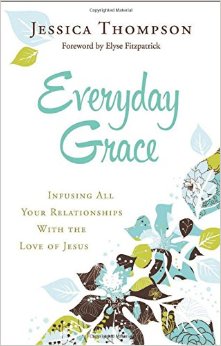
It’s my belief that any book that opens by quoting Janet Jackson is worth reading; Jessica Thompson’s newest book, Everyday Grace, is certainly no exception to that rule. In fact, I’d go so far to say that even without the reference to Janet Jackson the book is worth reading, and not just because Jess is a good friend. As she does in all of her written work, Jess skillfully and clearly communicates the Gospel of Jesus Christ—to the doctrine of the justification of sinners—from every page. From her astute insights into the multifaceted brokenness of all our relationships to her heart-felt, bare-bones confessions, this book is both a must read and a “you-won’t-be-able-to-put-it-down.”
 The book is broken into two parts (primarily). The first is comprised of chapters one through three and discusses humanity, divinity, and transformation. Let me explain: Jess doesn’t jump into discussing relationships, and rightly so. To properly speak of our relationships with others (and ourselves), one must establish a ground work on which to place the discussion. Jess does that by first pointing out the problem that is us and our baggage (our brokenness). We are broken human beings in relationship with other broken human beings—yikes!
The book is broken into two parts (primarily). The first is comprised of chapters one through three and discusses humanity, divinity, and transformation. Let me explain: Jess doesn’t jump into discussing relationships, and rightly so. To properly speak of our relationships with others (and ourselves), one must establish a ground work on which to place the discussion. Jess does that by first pointing out the problem that is us and our baggage (our brokenness). We are broken human beings in relationship with other broken human beings—yikes!
But she doesn’t stop there; she swiftly moves on to talk of the “Perfection of God” in chapter two. This perfect God is not only an example of a right and love-filled relationship in Himself (the Trinity) but also how this perfect God radically stooped low to restore our broken relationships with Himself, with others, and with ourselves. Here, in this chapter, she also sets up the clear delineation between God’s two words to us: Law and Gospel, Command and Promise, Life and Death.
 Chapter three, “How do we Change?”, is best described as the intersection of the human with the divine, the problem with the solution, the ugly with the beautiful. Transformation doesn’t occur with me or with my relationships because I have a list of all the best friend, best wife, best mother (etc.) attributes, but because I’ve been loved in a radical way when I was at my worst, that I–in all of my brokenness–am revealed and not reviled but loved, and that I’ve been forgiven and recreated and given new eyes to see my neighbor as they truly are: broken human beings just as I am. We love because we have first been loved.
Chapter three, “How do we Change?”, is best described as the intersection of the human with the divine, the problem with the solution, the ugly with the beautiful. Transformation doesn’t occur with me or with my relationships because I have a list of all the best friend, best wife, best mother (etc.) attributes, but because I’ve been loved in a radical way when I was at my worst, that I–in all of my brokenness–am revealed and not reviled but loved, and that I’ve been forgiven and recreated and given new eyes to see my neighbor as they truly are: broken human beings just as I am. We love because we have first been loved.
She spends the next eight chapters discussing how certain aspects of God’s relationship with us inform and provide a word of comfort for us in our relationships. But she doesn’t just discuss God’s character and what we can learn from it, she goes a step beyond and does something unique and rather creative: she incorporates Jesus’ relationships with other humans in his life on earth to show us that He really does understand our pain, our plight, and our need. It’s a risky move. Done poorly, it would have been a disaster; we must be cautious not to isolate certain aspects of Jesus’ life to use them as we wish. But Jess does it with remarkable deftness by faithfully adhering to the totality of the biblical witness about God.
Here are the concepts Jess addresses with this unique and creative approach:
- God Our Father and Our Relationships With Our Children
- Jesus Our Friend and Our Friendships
- God’s Mission and Our Relationships With Our Communities
- God our Husband and Our Marriages
- Jesus Our Brother and Our Relationships With Our Families
- Jesus Our High Priest and Our Relationships With Church Members
- Jesus a Carpenter and Our Relationships With Our Co-Workers
- The Holy Spirit Our Comforter/Helper and Our Relationship With Difficult People (taken directly from the table of contents)
It’s a comprehensive list that walks through every relationship I can think of that I have in my life (past, present, and future!). Jess treats each concept thoroughly, thoughtfully, and pastorally.
From the list above, it seems that Jess has pulled a Schleiermacher on us, and left the doctrine of the Holy Spirit to dead last. Actually, she hasn’t. Each chapter evidences that the doctrine of the Holy Spirit is not only important, but down right vital for all of those relationships mentioned. For any relationship to have true life and vitality, the Holy Spirit must be the One who is working in us and through us to love and serve others (and to receive that love and service from others!).
 Last and certainly not least is a short chapter on the Gospel and Relationship failures. Jess, as the good Law/Gospel theologian that she is, ends on a word of hope, encouragement, and truth: just because we’ve red this book, we won’t nail down all those rascally and difficult relationships and love people perfectly; we will fail at loving those who are difficult and even those for whom we would lay our lives down. But we are also radically forgiven, multiple times over radically forgiven. I know it’s tacky to reveal the very end, but I’ll quote her closing paragraph,
Last and certainly not least is a short chapter on the Gospel and Relationship failures. Jess, as the good Law/Gospel theologian that she is, ends on a word of hope, encouragement, and truth: just because we’ve red this book, we won’t nail down all those rascally and difficult relationships and love people perfectly; we will fail at loving those who are difficult and even those for whom we would lay our lives down. But we are also radically forgiven, multiple times over radically forgiven. I know it’s tacky to reveal the very end, but I’ll quote her closing paragraph,
When you sin in relationship, you have an advocate with the Father. You are free to confess yours sins to God and to others. You have nothing left to prove. You don’t have to justify yourself anymore. He is your propitiation. He has taken away all of God’s wrath. When you sin, you don’t need to go into hiding, you are free to walk in the light with all of your failures exposed. He as already paid for them all (201-2).
Jessica Thompson has gone above and beyond all of my expectations in Everyday Grace. She has given us a book that is an excellent tool to start difficult and vulnerable discussions with those we are in relationship with and especially with ourselves as we find ourselves and our brokenness tenderly laid bare by her words. Both lay people and pastors/educators alike will benefit in great ways from this book. Both men and women will be blessed by what is contained on every page. I highly recommend this book to all of you.

COMMENTS
2 responses to “A Review of Jess Thompson’s Everyday Grace”
Leave a Reply













Thanks Lauren….AI…….that means “Artificial Intelligence” or “All in” (in this case the latter). My only problem? – how many copies do I buy for friends before I read it myself?
Howie: Haha! All of ’em! Jess would love that! Haha! Thanks for commenting! Annnnd…thanks for reading!